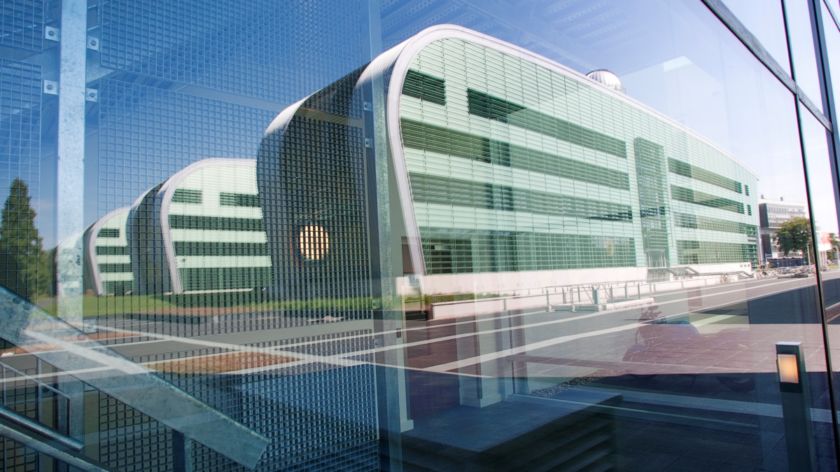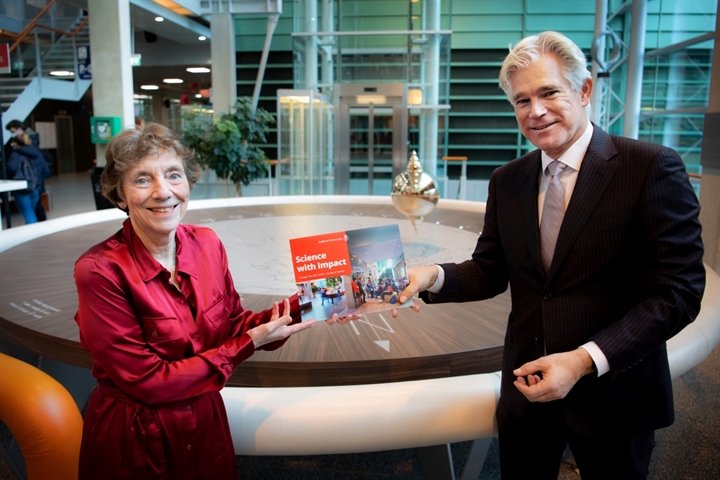Challenges face the new Dean of the Faculty of Science: ‘My greatest concern is mental health’
-
 Het Huygensgebouw. Foto: Dick van Aalst
Het Huygensgebouw. Foto: Dick van Aalst
Sijbrand de Jong took over from Lutgarde Buydens as Dean of the Faculty of Science this month with a minimum of ceremony. The festive handover was cancelled due to COVID-19 measures. The effect of the pandemic on the sciences is just one of the challenges facing the physics professor in the coming years. How does he intend to tackle them?
‘Sijbrand, is today your first day as Dean? Congratulations!’ It’s just after five o’clock on 1 December when Christoph Lüthy, former Dean of the Faculty of Philosophy, Theology and Religious Studies (FFTR), walks into the almost deserted Giga-Bite canteen in the Huygens Building. ‘Working overtime already?’, he asks as he passes by. ‘No, things aren’t that bad’, Sijbrand de Jong laughs. He tells us that over the past weeks, his predecessor Lutgarde Buydens has already done a good job of preparing him for his new job as Dean of the Faculty of Science. ‘I’m able to get off to a flying start.’
And a flying start is definitely what’s needed. The Faculty of Science (FNWI) faces considerable challenges in the coming years, in the areas of accommodation, COVID-19 measures, diversity and student assessments. And now it’s up to professor of high energy physics De Jong, as head of the Faculty of Science, to tackle them.
Curriculum vitae
Sijbrand de Jong (58) studied physics at Amsterdam, going on to also graduate in the field of experimental particle physics. That’s the branch of physics that researches the characteristics of the smallest elements of which all matter consists. He carried out part of that research at the CERN particle accelerator, a multi-kilometre underground experimental facility in Geneva where the Higgs particle was discovered. From 2015, De Jong was a member of the scientific council of CERN for a number of years.
He became Professor of High Energy Physics at Radboud University in 1998 and from 2005 to 2011 he was research director of IMAPP, a mathematics and physics institute within the Faculty of Science.
He is also involved in activities for the public. For example, in 2010, he made cosmic radiation ‘audible’ to the general public in Park Brakkenstein, an idea which won him the Academic Year Award in 2009. He was elected Nijmegen resident of the year in that same year.
COVID-19 gives a special start to your managerial task.
‘That’s true, but I think there are special circumstances in every period. Although obviously, COVID-19 has a significant impact straight away. As far as that’s concerned, my biggest worry is the mental health of the people in the faculty, and in particular of the students. It’s good that a lot of teaching is taking place face-to-face again and that students can meet each other but obviously, we don’t want any outbreaks of the disease here. So my message is: make use of the free tests you can request. The more people who consistently self-test, the greater the likelihood that face-to-face teaching can continue.’
What are your objectives in the area of education?
‘Our study programmes always scored very high in the student assessments, but recently we’ve seen a decline. Naturally, numbers aren’t everything but still, we need to get them up again. I want us to be back among the best study programmes in the world, and I want every graduate to be well-prepared when they enter the job market. I think we can achieve this by having the high-quality research we do here be even more present in the education. We have scientists who are involved at the highest levels of research worldwide, such as the Higgs particle and gravity waves, and in mathematics and biology too. Students really do have a front-row seat.’
The faculty strategy is to commit to more collaboration with industry. You have always been a fervent supporter of the importance of fundamental research. How do those two standpoints go together?
‘We’ve no intention of becoming industry’s R & D department, that’s something I want to guard against. If we don’t try to answer fundamental scientific questions, even if they have no immediate application, who will? That side of things must certainly not be downsized, but it can be done perfectly well here at the faculty alongside research that can be useful to society. Take for example ecology, energy and technology.’
‘We still understand very little of the psychology surrounding technology’
‘We can also collaborate more with other faculties. For example, we still understand very little of the psychology surrounding technology. We could easily set up test labs for that, together with the social faculty. Why do certain products make it on to the market and others don’t, for example. In the 1980s, Philips’ stereo systems and video recorders lost out to AKAI and the VHS system. The Philips products were technically more robust but apparently, the other brands were significantly more attractive. What the consumer wants from us depends on much more than technology alone.’
The FNWI has been growing a lot in recent years, both in student numbers and staff. Is that tenable in the current buildings?
‘No. Lack of space at the faculty is becoming an increasingly pressing issue. For a long time, numbers of employees at the FNWI were reasonably constant, around a thousand FTE in total. There was always a shortage of space – some departments have been housed in Mercator for years. But now we’re expanding further, to 1300 FTE or more, and we simply don’t have the room.’

How will you solve that?
‘There’s been a lot of moving things around already. For example, the student canteens have been replaced by office space. That’s just temporary, hopefully. And we’re going to create extra classrooms in the Transitorium. Also, we’ve reduced the standard number of square metres per person (first from 15 to 12 square metres and now even to 10 square metres, ed.). But at some point, you can’t take that any further. It’s not as though we can all start standing on one leg. We simply must have more space.’
In the form of a new, fifth wing on the Huygens, for example?
‘That’s certainly one option being considered in the discussions we’re currently holding with the Executive Board. A long-term plan like this is important, but the problem is that it will be years before a new wing, or extra building, is actually completed. Even more so now that construction companies are so busy. We need a short-term solution too. But we haven’t yet decided what that solution will be. Due to COVID-19, a lot of people are working at home which is a blessing in disguise.’
The Executive Board recently gave astrophysics Professor Heino Falcke 12 million euros and you’re asking for larger premises. Isn’t the university already putting enough money into the FNWI?
‘Of course, 12 million is a lot of money but it’s nothing compared to the cost of a new building. I’m really happy that the university is investing long-term in very good research groups. A lot of research needs to have financial security for more than just a couple of years. That applies to Falcke’s black holes, but also for example to the MRI scanners of the Donders Institute, the laser and magnet lab HFML-Felix and a whole lot of other research.
It should actually be a task of the NWO to offer possibilities for that kind of long-term funding, rather than of the university. But the NWO doesn’t do that and the projects in the Gravity programme (an NWO subsidy scheme for long-term research, ed.) have now been cut back from ten to six years too. Incidentally, there are more things the NWO doesn’t do, such as its outreach and educational tasks, which are barely dealt with at all.’
‘A collaborative project is a hundred times more effective than having people take workshops about the importance of diversity’
You used to be the Chair of the scientific council at the CERN particle accelerator. What take-aways did you get from Geneva?
‘At CERN, I learned how to get things done through good diplomacy. And how to apply diversity in practice by working together on a big scientific goal. Diversity and inclusiveness at the Faculty of Science could still be improved – not only in terms of gender imbalance but also culturally. I’m convinced that a collaborative project – such as the CERN particle accelerator – can bridge cultural differences and have a damping effect on potential conflicts. It’s a hundred times more effective than having people take workshops about the importance of diversity.’
Managing is a very different job to performing research. Aren’t you going to miss that?
‘I won’t have time for my own research anymore. That’s a shame because I still enjoyed it. But becoming Dean was on my list of things I wanted to do. I have gained enough managerial experience and I want to give something back to the faculty, since I’ve always felt I had an awful lot of freedom here.
There’s a climate here in which people can really develop personally. The Faculty of Science is an incredibly good faculty. All of us here know that, but it wouldn’t do any harm to say it out loud more often.’



